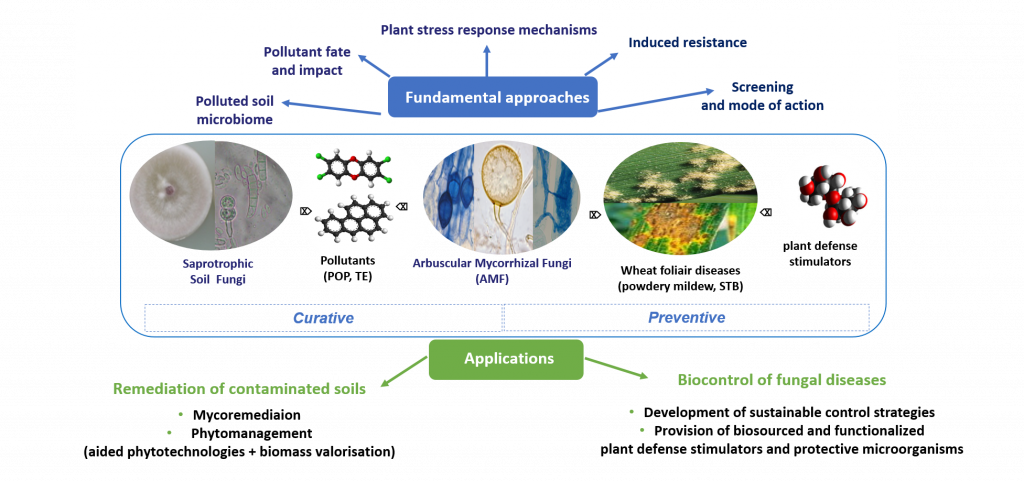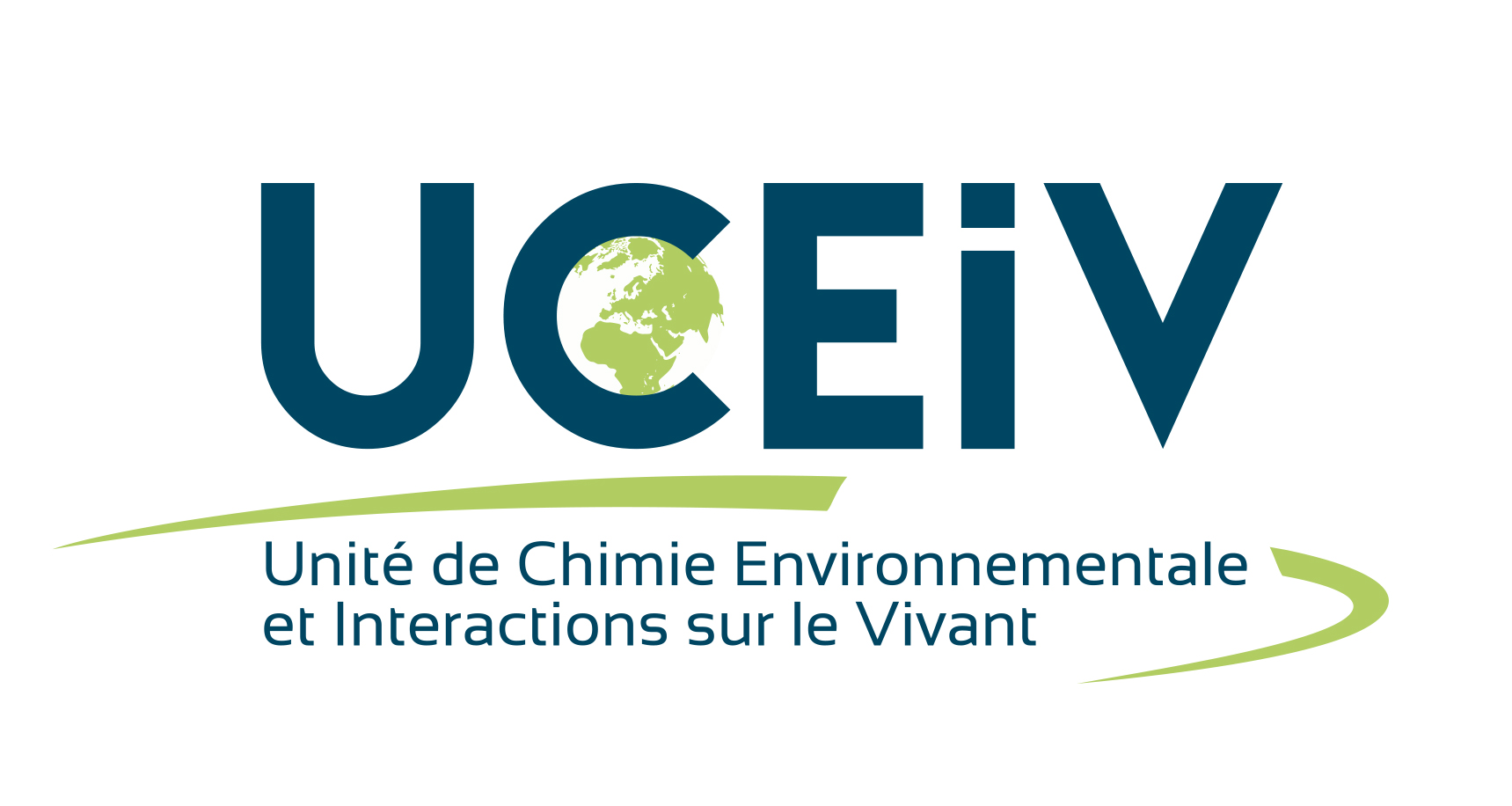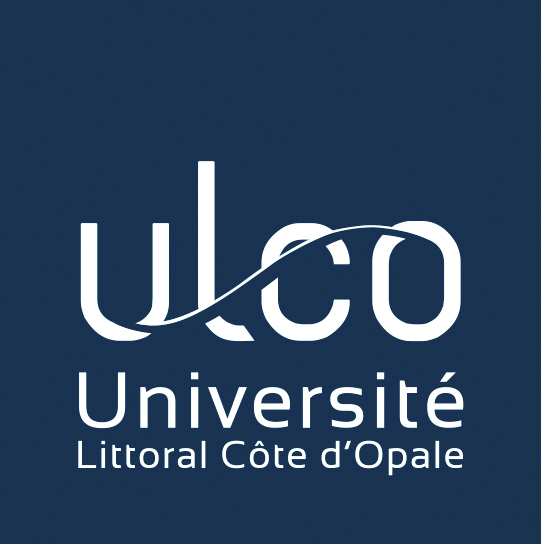Research activity
The IPCR team’s research activities are based on its expertise in mycology, in particular on the interactions between plants and fungi (phytopathogenic as well as symbiotic fungi), and in physiology, cytology, biochemistry, molecular biology and microbial ecology. They are organized in two main fields :

1 – Biocontrol of wheat foliar fungal diseases
This research theme aims to develop new biocontrol and sustainable control strategies against wheat fungal parasites, using Plant Defense Stimulants (PDSs) and/or beneficial bacterial (Plant Growth-Promoting Rhizobacteria) or fungal (Plant Growth-Promoting Fungi) microorganisms such as arbuscular mycorrhizal fungi and/or biostimulants in plant protection. Our studies focus on two pathosystems in particular, wheat/Blumeria graminis f.sp. tritici (agent of powdery mildew) and wheat/Zymoseptoria tritici (agent of septoria). The study of defense reactions in wheat and the optimization of the protective efficacy of SDPs in response to various environmental factors that may influence the establishment of such protection (wheat genotype, nutritional status of the plant, soil microbiota, climate change, etc.) are the main objectives of our work.
2- Phytomanagement and Bioremediation of contaminated soils.
This research theme aims to develop alternative, gentle and sustainable methods of remediation and management of contaminated soils.
In the case of phytomanagement, the feasibility, effectiveness and sustainability of the main phytotechnologies (phytostabilisation, phyto/rhizodegradation and phytoextraction) are being studied from the laboratory scale under controlled conditions to that of in situ workshop sites (demonstrators).
The aim is (1) to study the performance of different plant species and soil improvers, especially biological ones based on arbuscular mycorrhizal fungi, in the fate (mobility, transfer, dissipation) of organic pollutants (e.g., in the form of a fungus): PAHs, dioxins/furans, alkanes) and inorganic pollutants (trace elements), (2) to develop non-food channels for the valorisation of phytomass produced on polluted soils, (3) to monitor the influence of phytotechnologies on the refunctioning of contaminated soils, in particular via the characterisation of their microbiota and (4) to assess the environmental and health risks after treatment.
In a complementary way, bioremediation consists in exploiting, in particular, the diversity of saprotrophic fungi within the framework of the biodegradation of organic pollutants such as PAHs, dioxins/furans and emerging pollutants not only in the soil but also in other matrices (water, sediments, gaseous effluents, biogas). This work aims to study the mechanisms involved in the degradation of organic pollutants (availability, transport and incorporation, degradation), and the interest of using natural polysaccharides (modified starches) as solubilising agents for these pollutants.
Team members
PERMANENT STAFF | |
BOURDON-FACON Natacha | AI |
| CHEVALIER Wilfried | MCF |
Pr | |
PR | |
LARUELLE Frédéric | IR |
PR | |
MCF | |
RAFIN Catherine | MCF-HDR |
MCF | |
IR | |
VEIGNIE Etienne | MCF |
NON-PERMANENT STAFF | |
Papa Mamadou Sitor NDOUR | Post-Doc |
Julien LANGRAND | ATER |
Scientific collaboration
Régionals :
- BioGAP, Institut Charles Viollette – ISA de Lille
- ProBIOGEM, Institut Charles Viollette –Université de Lille
- Laboratoire Génie Civil et géoEnvironnement, Université de Lille
- UMRT-INRAE 1158 BioEcoAgro – BIOPI – Université de Picardie Jules Verne
- Unité Transformations & Agroressources (ULR7519) – Université d’Artois
- UMR Transformation Intégrée de la Matière Renouvelable (TIMR), Ecole Supérieure de Chimie Organique et Minérale (ESCOM), Université de Technologie de Compiègne
- AGHYLE, Institut Polytechnique UniLaSalle, Beauvais
Nationals :
- Unité de Recherche Vigne et Vin de Champagne, URCA à Reims
- UMR Agroécologie, INRA de Dijon
- Unité Technologie Propres et Economie Circulaire (TPEC) – NERIS
- INRAE, SVQV, UMR A 1131 – Université de Strasbourg
Internationals :
- Laboratoire de Recherche en Développement Durable et Santé – Université Cadi Ayyad – Marrakech – Maroc
- Laboratoire Biotechnologie Végétale et Agrophysiologie des Symbioses – Université Cadi Ayyad – Marrakech – Maroc
- Laboratoire d’Amélioration Génétique des Plantes, Université d’Annaba (Algérie)
- Université des Sciences et de la Technologie Houari Boumédiène (USTHB, Algérie)
- Université de Djelfa (Algérie)
- Helmholtz Zentrum München – German Research Centre for Environmental Health, Institute of Soil Ecology, (Allemagne)
- Laboratory of Phytopathology, Université de Gand (Belgique)
- Unité de Chimie Biologique Industrielle, Université de Liège (Gembloux Agro Bio Tech) (Belgique)
- Laboratoire de Mycologie, Université de Louvain-la-Neuve (Belgique)
- Agriculture et Agroalimentaire (Ottawa)
- IRBV (Montréal)
- Université de Montréal (Canada)
- Faculté d’Agronomie, Université Saint-Esprit de Kaslik, université Libanaise (Liban)
- Université Vasile Alecsandri de Bacau, Roumanie
- Laboratoire de Génétique et Amélioration des Plantes, INAT de Tunis, Centre National de la Recherche en Agriculture Oasienne (Tunisie)
- Centre National de la Recherche en Agriculture Oasienne (Tunisie)
- Laboratory of Plant Pathology, Federal University of Santa Catarina, Florianópolis (Brésil).
Current Thesis
Prénom Nom | Période | Titre |
| Julien Langrand | 2020-2023 | Phytomanagement for the refunctionalization of polluted soils and ecosystem services: optimizing the essential oil sector in the bioeconomy |
| Mathieu Delaeter | 2021-2024 | Development of specific molecular markers for resistance induction in wheat in response to mycorrhizal inoculation to control two fungal diseases: septoria and powdery mildew |
| Camille Carton | 2021-2024 | PROposition of new BIOsourced molecules of plant origin in the fight against plant diseases |
Mathie Craquelin | 2022-2025 | Chitosan and its derivatives: towards new biosourced active ingredients for biocontrol |
Paola Villanueva Rosales | 2023-2026 | Development of biostimulants for field crops and market gardening |
Research agreement
Internationals Projects
- 2021-2024 : PHC-TOUBKAL project : Contribution of mycorrhizal inoculation in the production of essential oils in some MAPs of the Marrakech region, in collaboration with a Moroccan partner: A. Qaddoury, Cadi Ayyad University.
- 2016-2021 : INTERREG V France-Flanders-Walloon project, ” Project portfolio : SMARTBIOCONTROL (26 partners from university laboratories, research centres or farmers’ unions).
- BIOSCREEN project: “New biosourced and multifunctional molecules for the control of phytopathogenic agents in crops in the cross-border region”. Some of them will be derived from CMA.
- BIOPROTECT project: “Biological protection in practice: optimisation of the effectiveness of (new) biological pesticides in the field”. Different CMA species will be tested for their protective potential against powdery mildew and septoria in wheat.
- 2016-2019 : ARIMNET – BACPLANTS project: Towards sustainable agriculture by increasing plant tolerance to biotic stress in the context of climate change (4 partners).
- 2017-2020 : CAPES-COFECUM “BIOSTIMALG” project: using algae for more sustainable agriculture. (2 partners)
Nationals Projects
- 2021-2024 : PIA – Programme d’Investissement d’Avenir – Ville Durable – Site du Crouy : Applied scientific and technical research project aimed at evaluating the relevance of using locally produced composts in the sustainable management of degraded soils in dense urban areas (5 partners).
- 2021-2024 : DEPHYTOP project (ADEME, APR GRAINE): Demonstrator of phytomanagement of soils contaminated by TMEs based on the circular economy: Optimisation of the essential oils sector (10 academic, private and institutional partners).
- 2017-2021 : PHYTEO project, Phytostabilization and Essential Oil (ADEME, APR GRAINE): Essential oil production: an eco-innovative pathway for the conversion of historically polluted soils (6 academic and private partners).
- 2018-2022 : EXTRA-Zn project (ADEME, APR GRAINE): ): Production of Zn-enriched biomasses by phytoextraction for ecocatalysis (4 partners).
- 2015-2018: IRIS+ project – FUI: Innovative solutions for the health of vines and wheat combining applications of biostimulants and SDP with imaging and agri-equipment technologies. (4 private partners, 3 academic partners)
Regionals Projects
- CPER BiHauts-Eco de France (2021-2027)
- CPER ECRIN (2021-2027)
- 2023-2025: MycUp Project (Stimule STIP Project): Zero residue valorisation of the lignocellulosic growth medium of edible fungi: use in biocontrol and biostimulation.
- 2022-2025 : PROZYMO project (Stimule project): Enzymatic production of new plant defence molecules.
- 2018-2024: MINIPEST project: Minimising the use of pesticides in arable and vegetable farming systems in Hauts-de-France. DEPHY EXPE project. (8 partners)
- 2016-2022 : CPER project « ALIBIOTECH Food and Biotechnology ».
WP 1. Characterization of the plant’s interaction with its environment
WP 2. Biological activities of biomolecules and secondary metabolites from plants and/or micro-organisms
- 2019–2021 : A2U project : ULCO/UPJV. Tripartite interaction as an alternative control method against powdery mildew and septoria in wheat, TRIPLET.
- 2022: VANIFUN project (SFR Condorcet): Evaluation of vanillin derivatives: application in plant protection against fungal pathogens.
- 2021 : PHYTOFONC project (SFR Condorcet): Contribution of organic amendments in the phytostabilisation of metallic trace elements and the refunctionalisation of the soil.
Private research contracts
- STOLZ industrial contract (2018, 2020): Monitoring the microbiological quality (fungi and bacteria) of animal meal during an innovative sterilisation process.
- LHOIST industrial contract (2019): Study of the antifungal properties, in vitro, of 2 products (Ca(OH)2 and CaCO3) on 3 phytopathogenic fungi of wheat.
Recent publications
- DUCOUSSO-DETREZ A., LAHRACH Z., FONTAINEZ J., LOUNES-HADJ SAHRAOUI A., HIJRI M., Cultural techniques capture diverse phosphate-solubilizing bacteria in rock phosphate-enriched habitats. Frontiers in Microbiology, 2024, ⟨10.3389/fmicb.2024.1280848⟩. ⟨hal-04443174⟩
- OFORI-AGYEMANG F., WATERLOT C., MANU J., LALOGE R., FRANCIN R., PAPAZOGLOU E., ALEXOPOULOU E., LOUNES-HADJ SAHRAOUI A., TISSERAND B., MENCH M., BURGES A., OUSTIERE N., Plant testing with hemp and miscanthus to assess phytomanagement options including biostimulants and mycorrhizae on a metal-contaminated soil to provide biomass for sustainable biofuel production. Science of the Total Environment, 2024, 912, pp.169527. ⟨10.1016/j.scitotenv.2023.169527⟩. ⟨hal-04362740⟩
- MEJRI S., GHINET A., MAGNIN-ROBERT M., RANDOUX B., ABUHAIE C.-M., TISSERANT B., GAUTRET P., RIGO B., HALAMA P., REIGNAULT P., SIAH A., New plant immunity elicitors from a sugar beet byproduct protect wheat against Zymoseptoria tritici. Scientific Reports, 2023, 13 (1), p.90. ⟨10.1038/s41598-022-26800-z⟩. ⟨hal-04048754⟩
- ALLARIO T., FOURQUEZ A., MAGNIN-ROBERT M., SIAH A., GAUCHER M., MAIA-GRONDARD A., BRISSET M.-N., HUGUENEY P., REIGNAULT P., BALTENWECK R., RANDOUX B., Analysis of defense-related gene expression and leaf metabolome in wheat during the early infection stages of Blumeria graminis f.sp. tritici. Phytopathology, 2023, ⟨10.1094/PHYTO-10-22-0364-R⟩. ⟨hal-04091467⟩
- BOUCHIAT R., VEIGNIE E., KACZMAREK F., DORCHY J., FORTUNATO A.-D., RAFIN C., A Comprehensive Review of Risk Assessments of Organic Effluents in Car Workshops. Environments, 2023, 10 (12), pp.220. ⟨10.3390/environments10120220⟩. ⟨hal-04356111⟩
- BENCHERIF K., LARUELLE F., TISSERANT B., DALPE Y., LOUNES-HADJ SAHRAOUI A., Engineering Approach for Production of Arbuscular Mycorrhizal Inoculum Adapted to Saline Soil Management. Stresses, 2023, 3 (2), pp.404 – 423. ⟨10.3390/stresses3020030⟩. ⟨hal-04063461⟩
- PLATEL R., LUCAU-DANILA A., BALTENWECK R., MAIA-GRONDARD A., TRAPET P., MAGNIN-ROBERT M., RANDOUX B., DURET M., HALAMA P., HILBERT J.-L., COUTTE F., JACQUES P., HUGUENEY P., REIGNAULT P., SIAH A., Deciphering immune responses primed by a bacterial lipopeptide in wheat towards Zymoseptoria tritici. Frontiers in Plant Science, 2023, 13, pp.1074447. ⟨10.3389/fpls.2022.1074447⟩. ⟨hal-03979567⟩
- BENCHERIF K., DALPE Y., LOUNES-HADJ SAHRAOUI A., LARUELLE F., TISSERANT B., Engineering Approach for Production of Arbuscular Mycorrhizal Inoculum Adapted to Saline Soil Management. Stresses, 2023, 3 (2), pp.404 – 423. ⟨10.3390/stresses3020030⟩. ⟨hal-04344973⟩
LANGRAND J., LOUNES-HADJ SAHRAOUI A., DUCLERCQ J., RAVEAU R., LARUELLE F., BERT V., FACON N., TISSERANT B., FONTAINE J., Coriander (Coriandrum sativum) Cultivation Combined with Arbuscular Mycorrhizal Fungi Inoculation and Steel Slag Application Influences Trace Elements-Polluted Soil Bacterial Functioning. Plants, 2023, 12 (3), pp.618. ⟨10.3390/plants12030618⟩. ⟨hal-03992461⟩
- AKACHOUD O., BOUAMAMA H., FACON N., ZOUBI B., BENKEBBOURA A., GHOULAM C., QADDOURY A., LOUNES-HADJ SAHRAOUI A., LARUELLE F., Mycorrhizal Inoculation Improves the Quality and Productivity of Essential Oil Distilled from Three Aromatic and Medicinal Plants: Thymus satureioides, Thymus pallidus, and Lavandula dentata. Agronomy, 2022, 12 (9), pp.2223. ⟨10.3390/agronomy12092223⟩. ⟨hal-04063464⟩
- VELHO A., DALLASTA P., DE BORBA M., MAGNIN-ROBERT M., REIGNAULT P., SIAH A., STADNIK M., RANDOUX B., Defense responses induced by ulvan in wheat against powdery mildew caused by Blumeria graminis f. sp. tritici. Plant Physiology and Biochemistry, 2022, 184, pp.14-25. ⟨10.1016/j.plaphy.2022.05.012⟩. ⟨hal-03673184⟩
- FONTAINE J., DUCLERCQ J., FACON N., DEWAELE D., LARUELLE F., TISSERANT B., LOUNES-HADJ SAHRAOUI A., Coriander (Coriandrum sativum L.) in Combination with Organic Amendments and Arbuscular Mycorrhizal Inoculation: An Efficient Option for the Phytomanagement of Trace Elements-Polluted Soils. Microorganisms, 2022, 10 (11), pp.2287. ⟨10.3390/microorganisms10112287⟩. ⟨hal-03881486⟩
- VEIGNIE E., RAFIN C., Efficiency of Penicillium canescens in Dissipating PAH in Industrial Aged Contaminated Soil Microcosms and Its Impact on Soil Organic Matter and Ecotoxicity. Processes, 2022, 10 (3), pp.532. ⟨10.3390/pr10030532⟩. ⟨hal-03689595⟩
- EL HOUDA RAOUANI N., CLAVERIE E., RANDOUX B., CHAVERIAT L., YASEEN Y., YADA B., MARTIN P., CABRERA J. C., JACQUES P., REIGNAULT P., MAGNIN-ROBERT M., LOUNES – HADJ SAHRAOUI A., Bio-Inspired Rhamnolipids, Cyclic Lipopeptides and a Chito-Oligosaccharide Confer Protection against Wheat Powdery Mildew and Inhibit Conidia Germination. Molecules, 2022, 27 (19), pp.6672. ⟨10.3390/molecules27196672⟩. ⟨hal-03806266⟩
- PLATEL R., SAWICKI M., ESMAEEL Q., RANDOUX B., TRAPET P., EL GUILLI M., CHTAINA N., ARNAULD S., BRICOUT A., ROCHEX A., BOURDON N., HALAMA P., JACQUARD C., BARKA E. A., REIGNAULT P., MAGNIN-ROBERT M., SIAH A., Isolation and Identification of Lipopeptide-Producing Bacillus velezensis Strains from Wheat Phyllosphere with Antifungal Activity against the Wheat Pathogen Zymoseptoria tritici. Agronomy, 2022, 12 (1), pp.95. ⟨10.3390/agronomy12010095⟩. ⟨hal-03511669⟩
- PLATEL R., LUCAU-DANILA A., BALTENWECK R., MAIA-GRONDARD A., CHAVERIAT L., MAGNIN-ROBERT M., RANDOUX B., TRAPET P., HALAMA P., MARTIN P., HILBERT J.-L., HOFTE M., HUGUENEY P., REIGNAULT P., SIAH A., Bioinspired Rhamnolipid Protects Wheat Against Zymoseptoria tritici Through Mainly Direct Antifungal Activity and Without Major Impact on Leaf Physiology. Frontiers in Plant Science, 2022, 13, pp.878272. ⟨10.3389/fpls.2022.878272⟩. ⟨hal-03704459⟩
- Ducousso-Détrez, A.; Fontaine, J.; Lounès-Hadj Sahraoui, A.; Hijri, M. Diversity of Phosphate Chemical Forms in Soils and Their Contributions on Soil Microbial Community Structure Changes. Microorganisms, 2022, 10, 609. https://doi.org/10.3390/microorganisms10030609.
- RAVEAU, R.; FONTAINE, J.; SOLTANI, A.; MEDIOUNI BEN JEMÂA, J.; LARUELLE, F.; LOUNÈS-HADJ SAHRAOUI, A. : In Vitro Potential of Clary Sage and Coriander Essential Oils as Crop Protection and Post-Harvest Decay Control Products. Foods 2022, 11, 312, 2022. https://doi.org/10.3390/ foods11030312.
- M.C. de BORBA, A.C. VELHO, M.B. de FREITAS, M. HOLVOET, A. MAIA-GRONDARD, R. BALTENWECK, M. MAGNIN-ROBERT, B. RANDOUX, J.-L. HILBERT, Ph REIGNAULT, P. HUGUENEY, A. SIAH, M.J. STADNICK. A laminarin-based formulation protects wheat against Zymoseptoria tritici via direct antifungal activity and elicitation of host defense-related genes. Plant Disease, 2022, 106 (5), pp.1408-1418. ⟨10.1094/PDIS-08-21-1675-RE⟩. ⟨hal-03623999⟩
- M. JERBI, S. LABIDI, F. LARUELLE, B. TISSERANT, F. BEN JEDDI, A. LOUNÈS-HADJ SAHRAOUI. : Mycorrhizal biofertilization improves grain yield and quality of Hulless Barley (Hordeum vulgare ssp. nudum L.) under water stress conditions. Journal of Cereal Science, 2022, 104, pp.ID 103436. ⟨10.1016/j.jcs.2022.103436⟩. ⟨hal-04345905⟩
- M. JERBI, S. LABIDI, F. LARUELLE, B. TISSERANT, Y. DALPE, A. LOUNES-HADJ SAHRAOUI, F. BEN JEDDI. : Contribution of native and exotic arbuscular mycorrhizal fungi in improving the physiological and biochemical response of Hulless Barley (Hordeum vulgare ssp. nudum L.) to drought. Journal of Soil Science and Plant Nutrition, 2022, 22 (2), pp.2187 – 2204. ⟨10.1007/s42729-022-00802-2⟩. ⟨hal-04063463⟩
- A. LOUNES-HADJ SAHRAOUI, M. CALONNE-SALMON, S. LABIDI, H. MEGLOULI, J. FONTAINE ; Chapter 3 : Arbuscular mycorrhizal fungi-assisted phytoremediation: Concepts, challenges, and future perspectives. In : Assisted PhytoremediationEdited by V. Pandey. Elsevier. 2022. Pp49-100. https://doi.org/10.1016/C2019-0-04894-7.

